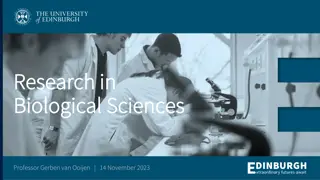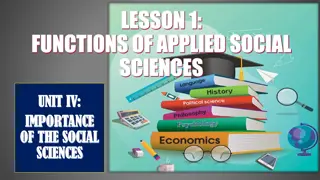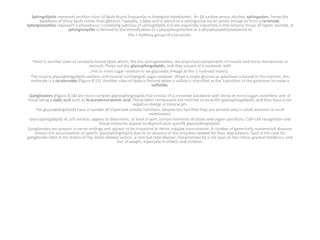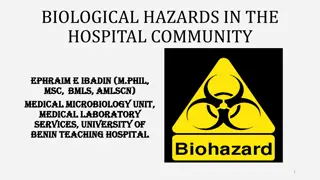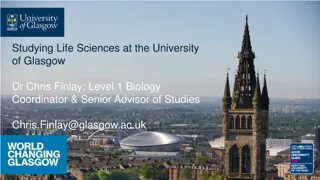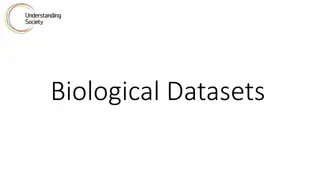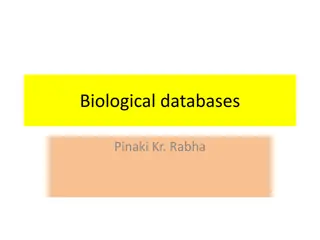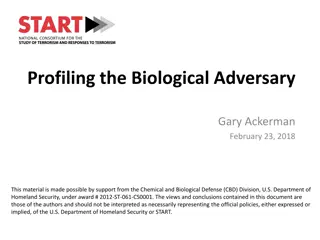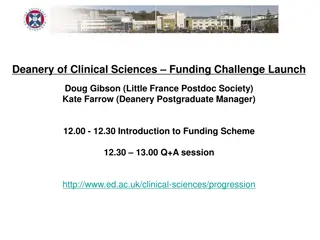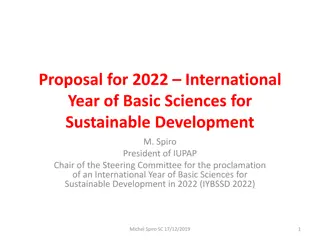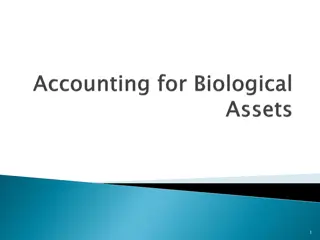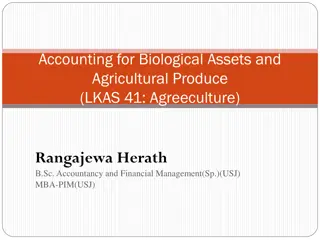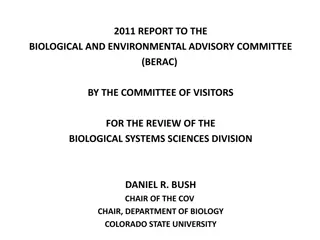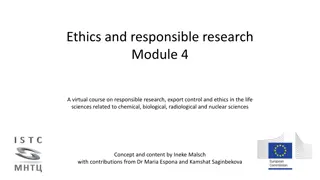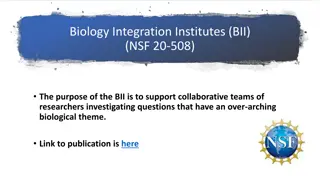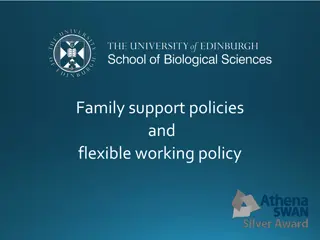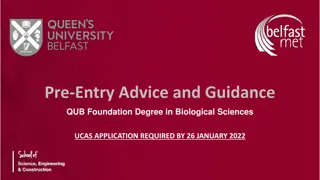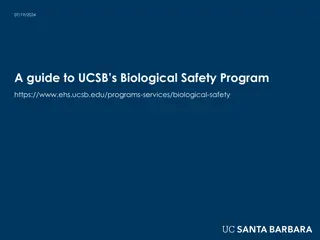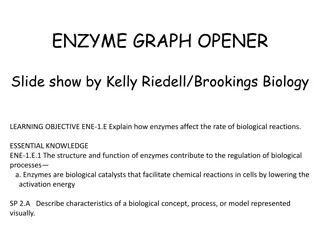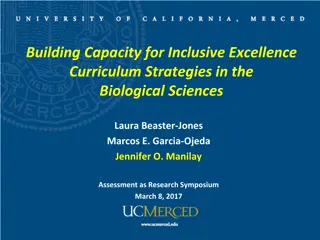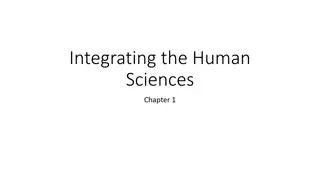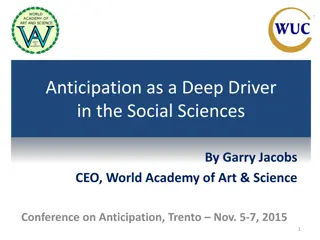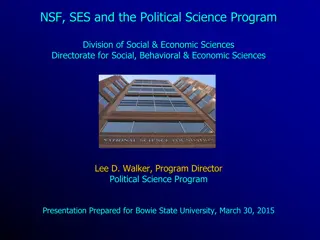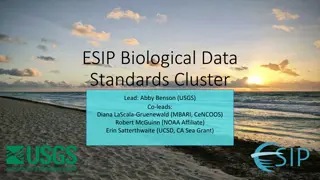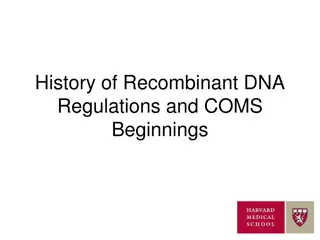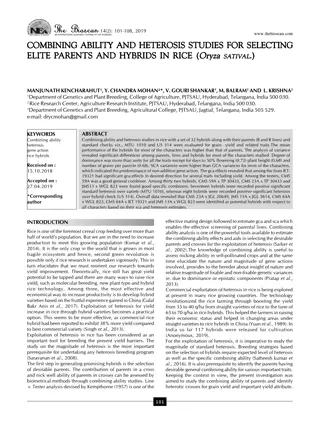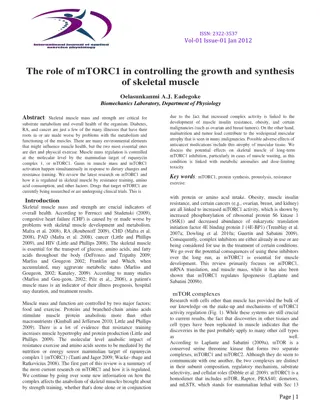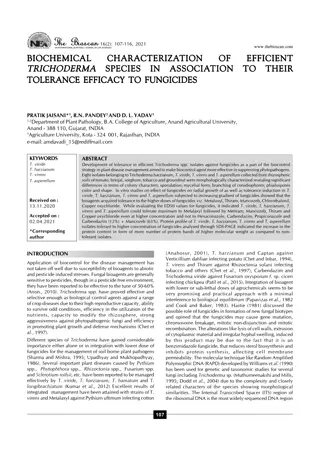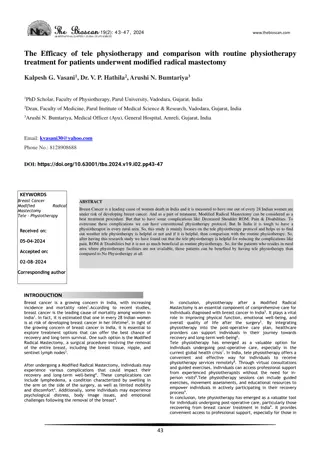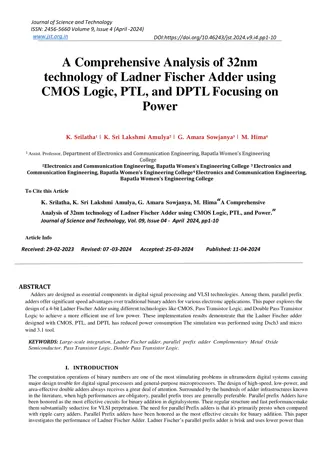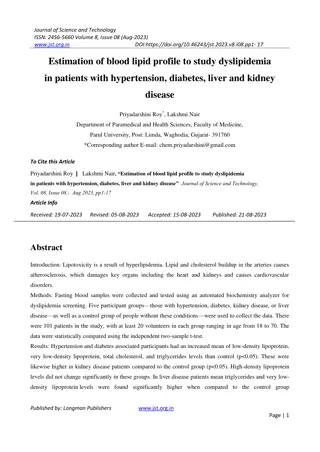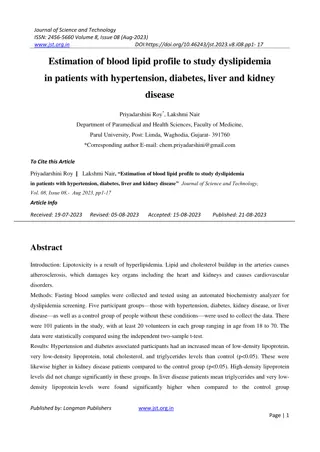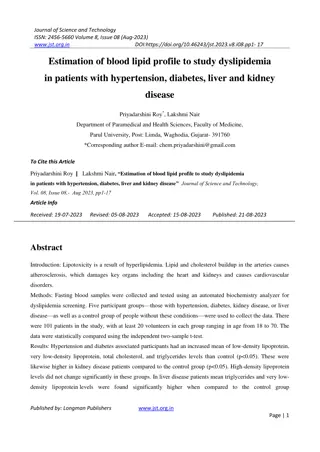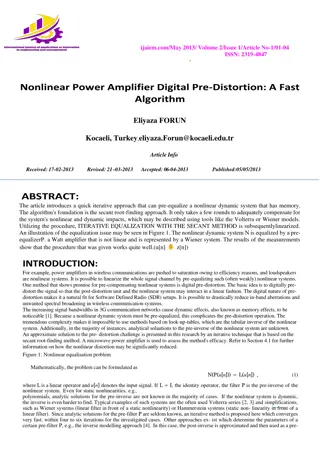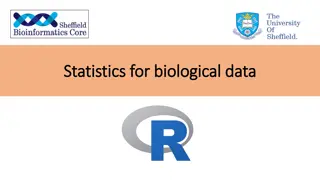Orientation Bachelor of Early Childhood Education – Part-Time (ECE-MAJ)
Singapore University of Social Sciences (SUSS) is Singapore's newest autonomous university, offering a range of undergraduate and postgraduate programs focused on social sciences, business, arts, behavioral sciences, science, technology, law, and lifelong learning. With a student population of over
1 views • 47 slides
Updating ERC Panel Structure for 2024 Calls: Rationale and Main Changes
The European Research Council will revise its panel structure for the 2024 calls to enhance coherence, focus on frontier research, and appreciate interdisciplinarity. The main principles reflect the overarching evaluation policy of the ERC, ensuring a forward-looking approach that evolves with the c
3 views • 12 slides
Opportunities in Postgraduate Research in Biological Sciences
Explore the benefits of postgraduate research in Biological Sciences, such as advancing global challenges, acquiring critical thinking skills, building a professional network, and personal development in a supportive environment. Discover the international research excellence, quality of life, and k
0 views • 17 slides
Importance of Social Sciences in Modern Society
Social sciences play a crucial role in addressing societal issues and understanding human behavior within different contexts. Despite the focus on STEM fields, social sciences are essential in areas like social work, justice systems, and business. This educational content highlights the functions an
8 views • 17 slides
Explore Agricultural and Biological Engineering (ABE) Programs at Purdue University
Discover the academic programs and valuable resources offered by the Agricultural and Biological Engineering (ABE) department at Purdue University. Meet the dedicated staff members, review degree options, and learn about upcoming events and registration processes. Explore opportunities in fields suc
2 views • 16 slides
Understanding Diverse Classes of Lipids in Biological Systems
Sphingolipids and waxes are important classes of lipids found in biological membranes, each with unique structures and functions. Sphingolipids, including sphingomyelins and glycosphingolipids, play crucial roles in nerve transmission, cell recognition, and tissue immunity. Waxes, on the other hand,
3 views • 4 slides
Biological Hazards in the Hospital Community
Healthcare workers face various occupational hazards, including biological risks, in hospital settings. This article by Ephraim E. Ibadin explores the definition, types, risk factors, sources, prevention, and control of biological hazards in hospitals, emphasizing the importance of protecting worker
0 views • 30 slides
Life Sciences Degree Options and Curriculum at University of Glasgow
Explore the diverse range of Life Sciences degree choices available at the University of Glasgow, including Animal Biology, Biomolecular Sciences, Human Life Sciences, and Infection & Immunology. Learn about the flexible curriculum structure, career prospects, and research-based work placements offe
2 views • 20 slides
Understanding Biological Datasets and Omics Approaches in Disease Research
Explore the world of biological datasets, lipidomics, genomics, epigenomics, proteomics, and the application of omics in studying biological mechanisms, predicting outcomes, and identifying important variables. Dive into DNA, gene expression, methylation, and genetic datasets to unravel the complexi
0 views • 34 slides
An Overview of Biological Databases in Bioinformatics
Biological databases play a crucial role in bioinformatics, storing vast amounts of data related to nucleotide sequences, protein sequences, and more. These databases are publicly accessible and essential for research in biological fields. Primary databases, such as GenBank, EMBL, and DDBJ, contain
0 views • 13 slides
Understanding Biological Adversaries: Education Levels and Demographics
Exploring the traits of biological adversaries, this study reveals that perpetrators with higher education levels are more likely to successfully use chemical and biological agents. Success tends to increase with age and years of activity. Most individual perpetrators originate from the MENA region,
0 views • 16 slides
Deanery of Clinical Sciences Funding Challenge 2018 Launch Event
The Deanery of Clinical Sciences is offering a small grant opportunity for early career researchers within the clinical sciences field. The fund aims to support researchers' current studies and research projects with a maximum grant of £2,500. Applications are open to postgraduates and postdocs, an
3 views • 7 slides
Celebrating Basic Sciences in 2022 for Sustainable Development
The proposal suggests declaring 2022 as the International Year of Basic Sciences for Sustainable Development, aiming to highlight the crucial role of curiosity-driven basic sciences in societal, environmental, and economic progress. Recognizing the significant contributions of basic sciences to vari
5 views • 13 slides
Understanding the ACT Reading Test Content
The ACT Reading Test comprises 40 questions to be answered in 35 minutes, covering four categories: Prose Fiction, Humanities, Social Sciences, and Natural Sciences. Each category has a specific percentage of questions. The test evaluates your ability to comprehend various passages, including prose
1 views • 24 slides
Accounting for Biological Assets and Agricultural Produce
At the end of this lesson, you will be able to identify the principal issues in accounting for biological assets and agricultural produce at the time of harvest. Topics include the recognition, measurement, presentation, and disclosure of biological assets in financial statements. Questions regardin
0 views • 26 slides
Accounting for Biological Assets and Agricultural Produce (LKAS 41: Agriculture) by Rangajewa Herath
This content provides insights into the accounting standards for biological assets and agricultural produce under LKAS 41, discussing classification, presentation, measurement, gain or loss recognition, and disclosure requirements. It covers the unique nature of biological assets, the scope of LKAS
0 views • 20 slides
Review of Biological Systems Sciences Division - 2011 Report
The Committee of Visitors (COV) reviewed the Biological Systems Sciences Division in 2011, focusing on the efficacy of processes for soliciting, reviewing, and monitoring proposals, as well as assessing the DOE Bioenergy Research Centers and JGI user facility. The COV consisted of 17 scientists who
0 views • 12 slides
Responsible Research & Ethics in Life Sciences Module 4
This virtual course on responsible research, export control, and ethics in the life sciences, focusing on chemical, biological, radiological, and nuclear sciences, emphasizes the importance of intangible technology, tacit knowledge, and the international legal regime in shaping scientific practices
0 views • 20 slides
Reexamining the Biological Race Debate by Quayshawn Spencer
Quayshawn Spencer reexamines the biological race debate, discussing the onto-semantic strategy, its problems, and applications to public health genomics. The philosophical foundations of biological racial anti-realism are critiqued, exploring the concept of race through historical perspectives like
0 views • 37 slides
Biology Integration Institutes (BII) - NSF Research Opportunity
Supporting collaborative teams of researchers exploring overarching biological themes, the Biology Integration Institutes (BII) provide a framework for integrated research in diverse biological disciplines. This initiative enables design and development activities, with potential for significant fun
0 views • 10 slides
Family Support Policies and Flexible Working Policy at The School of Biological Sciences
The School of Biological Sciences at the University of Edinburgh has local policies supporting family needs and flexible working arrangements. These policies include parental leave cover, workload expectations upon return from parental leave, and flexible working options. The school ensures that sta
0 views • 7 slides
QUB Foundation Degree in Biological Sciences: Course Overview and Entry Requirements
The QUB Foundation Degree in Biological Sciences is a Level 5 course equivalent to the first two years of a degree program. It offers a pathway towards a BSc (Hons) and covers a range of subjects including Genetics, Molecular Biology, Ecology, and more. The course, spanning two years, provides pract
0 views • 10 slides
Guide to UCSB Biological Safety Program
This guide provides an overview of UCSB's Biological Safety Program, covering important aspects such as lab safety fundamentals, biological use authorization, biosafety officer's role, and the Institutional Biosafety Committee. It outlines key steps like hazard assessment, training, waste management
0 views • 24 slides
Enzymes in Biological Reactions: Understanding Activation Energy
Enzymes, as biological catalysts, play a crucial role in regulating biological processes by lowering the activation energy required for chemical reactions in cells. The addition of enzymes changes the overall energy dynamics of reactions, impacting the rate at which products are formed. This interac
0 views • 7 slides
Enhancing Student Success in UC Merced Biological Sciences Program
Curriculum strategies and assessment outcomes are discussed for the Biological Sciences Major at UC Merced. The program aims to improve student proficiency in various learning outcomes through faculty-created rubrics and direct/indirect evidence assessment methods. Results show strengths and areas f
0 views • 19 slides
Understanding Human Sciences: Integrating Disciplines for Coherent Insight
This book explores the integration of human sciences, aiming to create a coherent understanding of the key phenomena studied across humanities and social sciences. It advocates for a unified approach that embraces the complexity of relationships and causal links within this system, offering construc
0 views • 6 slides
Exploring The Relationship Between Natural and Social Sciences Through Anticipation
Explore the distinct characteristics that define the natural and social sciences, delving into how anticipation serves as a deep driver in the social sciences. Uncover the fundamental principles of human behavior, the role of consciousness and subjective reality in social science, and the influence
0 views • 11 slides
Understanding the National Science Foundation's Social and Economic Sciences Programs
The National Science Foundation (NSF) supports basic research through its discipline-based structure, incorporating mechanisms like Research Experiences for Undergraduates and Minority Postdoctoral Research Fellowships. The Directorate for Social, Behavioral, and Economic Sciences houses programs su
0 views • 28 slides
Advancing Biological Data Standards for Marine Research
Discussion on biological data standards for marine research, challenges faced, existing standards, and the need for guidance and community building. Goals include maximizing data relevance for biodiversity studies. Ongoing work involves developing a primer for data managers unfamiliar with biologica
0 views • 7 slides
Understanding COMS and Recombinant DNA Regulations
The Committee on Microbiological Safety (COMS) was established in 1978 to address public concerns regarding safety, environment, and ethics of research involving hazardous biological agents. COMS oversees activities related to recombinant DNA and biological agents at Harvard, supporting all schools
0 views • 6 slides
journal of life sciences research and reviews journal of life sciences research
The Journal of Life Sciences Research and Reviews is an academic, peer-reviewed journal dedicated to publishing high-quality research articles, reviews, and critical analyses in the field of life sciences. It covers a broad range of topics, with an e
0 views • 8 slides
journal of biological and chemical sciences
The Journal of Biological and Chemical Sciences (JBCS) is a scholarly publication that focuses on research in the fields of biology and chemistry, with an emphasis on studies that bridge these two scientific disciplines. The journal typically feature
0 views • 10 slides
journal of life and bio-sciences research
The Journal of Life and Bio-Sciences Research is a scientific journal that focuses on publishing research articles, reviews, and short communications in the field of life sciences and biological research. It aims to provide a platform for researchers
0 views • 10 slides
journal of life and bio-sciences research
The Journal of Life and Bio-Sciences Research is a scientific journal that focuses on publishing research articles, reviews, and short communications in the field of life sciences and biological research. It aims to provide a platform for researchers
0 views • 5 slides
journal of life and bio-sciences research
The Journal of Life and Bio-Sciences Research is a scientific journal that focuses on publishing research articles, reviews, and short communications in the field of life sciences and biological research. It aims to provide a platform for researchers
0 views • 8 slides
journal of life and bio-sciences research
The Journal of Life and Bio-Sciences Research is an academic and scientific journal that focuses on publishing high-quality research articles, reviews, and studies in the fields of life sciences and biological sciences. It serves as a platform for re
0 views • 17 slides
journal of life and bio-sciences research
The Journal of Life and Bio-Sciences Research is an academic and scientific journal that focuses on publishing high-quality research articles, reviews, and studies in the fields of life sciences and biological sciences. It serves as a platform for re
0 views • 17 slides
journal of life and bio-sciences research
The Journal of Life and Bio-Sciences Research is an academic and scientific journal that focuses on publishing high-quality research articles, reviews, and studies in the fields of life sciences and biological sciences. It serves as a platform for re
0 views • 17 slides
journal of life and bio-sciences research
The Journal of Life and Bio-Sciences Research is an academic and scientific journal that focuses on publishing high-quality research articles, reviews, and studies in the fields of life sciences and biological sciences. It serves as a platform for re
0 views • 4 slides
Understanding Statistics for Biological Data in Courses
Dive into the world of statistics for biological data through a comprehensive course led by experienced instructors at the University of Sheffield. Explore the fundamentals of statistics, research questions, hypotheses, and hypothesis testing related to biological inquiries. Gain insights into organ
0 views • 14 slides


